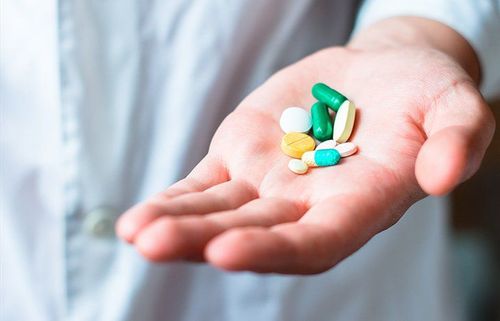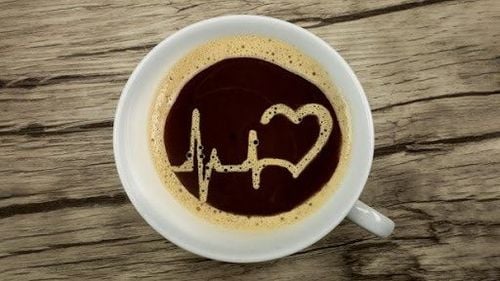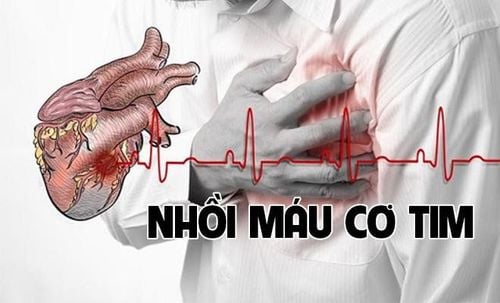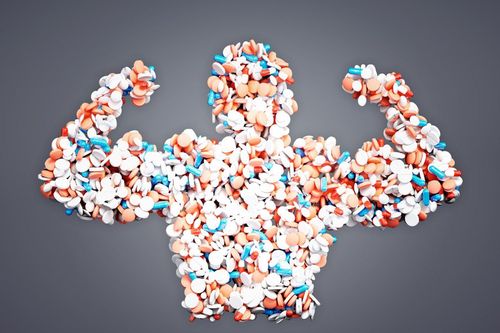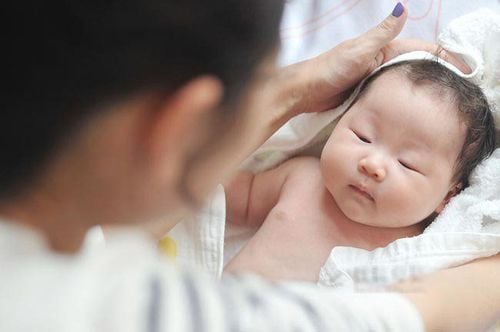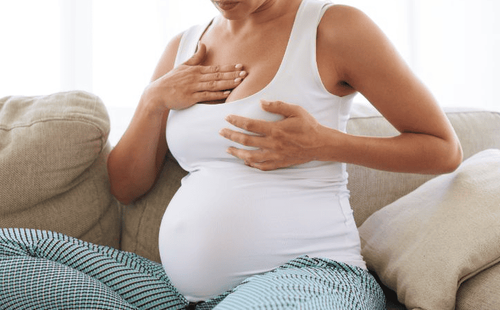This is an automatically translated article.
Caffeine is a compound found in certain plants that acts as a central nervous system stimulant. It can improve alertness and energy levels. Although caffeine is considered safe and may even have health benefits, many mothers wonder about the safety of caffeine while breastfeeding. So should nursing mothers use caffeine?1. Should nursing mothers use caffeine?
The answer is yes, but do not abuse them. After caffeine is ingested, it enters the bloodstream, and a small amount (usually less than 1%) is excreted in breast milk. The amount of caffeine in milk will peak a few hours after drinking.
Many experts say that a moderate amount of caffeine (no more than 300 milligrams per day, or about 500ml of coffee) is fine for nursing mothers and should not cause changes in most infant behaviours. born. But drinking more than 2 or 3 cups of coffee a day can make both mother and infant irritable, restless or agitated and can contribute to sleep problems.
Each different child will have differences in the metabolism of substances. If your child seems uncomfortable when you drink only small amounts of caffeine, you should eliminate caffeine from your diet to see if your child's response is due to the caffeine or something else.
The American Academy of Pediatrics recommends that nursing mothers should have no more than 3 cups of coffee a day and that it is safe for a nursing mother to have one cup of coffee a day.

2. Does drinking caffeine reduce breast milk production?
There is no evidence that caffeine reduces breast milk supply. Researchers found that several studies of caffeine intake in lactating mothers and years of clinical observation did not report adverse effects in terms of decreased breast milk production.
Trắc nghiệm: Những điều cần biết về kiêng cữ sau sinh
Sau sinh, cơ thể sản phụ sẽ có rất nhiều sự thay đổi, việc thực hiện tốt các kiêng cữ sau sinh và bổ sung đầy đủ các chất dinh dưỡng cho cơ thể sẽ giúp ích rất nhiều trong quá trình hồi phục sức khỏe. Bài trắc nghiệm dưới đây sẽ giúp mọi người có cái nhìn tổng quan về kiêng cữ sau sinh và thực hiện sao cho phù hợp nhất.The following content is prepared under supervision of Thạc sĩ, Bác sĩ y khoa, Tạ Quốc Bản , Sản phụ khoa , Khoa Sản phụ khoa - Bệnh viện Đa khoa Quốc tế Vinmec Phú Quốc
3. How much caffeine is safe for nursing mothers?
Although infants cannot process caffeine as quickly as adults, nursing mothers can still consume moderate amounts.
You can safely drink up to 300 mg of caffeine per day - or the equivalent of two to three cups (470–710 ml) of coffee. Based on current research, caffeine consumption within these limits while breastfeeding is unlikely to harm an infant.
A study of 885 infants showed an association between mothers consuming more than 300 mg of caffeine per day and an increase in the infant's nighttime awakening frequency.
When nursing mothers consume more than 300 mg of caffeine per day - such as more than 10 cups of coffee - infants may be fussy and restless in addition to sleep disturbances.
Moreover, consuming too much caffeine can cause negative effects on the mother herself, such as: Anxiety, restlessness, heart palpitations, dizziness and insomnia.
4. What foods and drinks contain caffeine?
The most popular caffeinated beverage is coffee. The amount of caffeine in a serving of coffee varies widely, depending on the type of bean, how it's roasted, how it's brewed - and, obviously, on the size of the cup.
However, to control caffeine intake, you need to be mindful of other food sources, such as: Tea, soft drinks, energy drinks, chocolate and coffee ice cream. Caffeine also appears in herbal products and some over-the-counter medicines, including some remedies for headaches, colds, and allergies.
Here is the amount of caffeine in common foods and drinks, you can refer to:
| Cà phê | Lượng | Caffeine |
| Cà phê, pha máy thông thường | 230 ml | 95 -200 mg |
| Cà phê Starbucks pha máy | 460 ml | 211 mg |
| Cà phê latte, misto hoặc cappuccino (Starbucks) | 460 ml | 150 mg |
| Cà phê latte, misto hoặc cappuccino (Starbucks) | 350 ml (nhỏ) | 75 mg |
| Cà phê espresso (Starbucks) | 30 ml | 75 mg |
| Cà phê espresso (thông thường) | 30 ml | 64 mg |
| Cà phê hạt hoà tan thông thường | 1 muỗng cà phê | 31 mg |
| Trà | Lượng | Caffeine |
| Trà đen pha máy | 230 ml | 47 mg |
| Trà xanh pha máy | 230 ml | 25 mg |
| Trà đen tách caffeine | 230 ml | 2 mg |
| Starbucks Tazo Chai Tea latte | 460 ml | 95 mg |
| Trà hoà tan không đường | 1 muỗng cà phê | 26 mg |
| Trà Snapple | 460 ml | 42 mg |
| Trà Lipton | 350 ml | 5 mg |
| Nước giải khát | Lượng | Caffeine |
| Coke | 350 ml | 35 mg |
| Diet Coke | 350 ml | 47 mg |
| Pepsi | 350 ml | 38 mg |
| Diet Pepsi | 350 ml | 36 mg |
| Jolt Cola | 350 ml | 72 mg |
| Mountain Dew | 350 ml | 54 mg |
| 7-up | 350 ml | 0 mg |
| Sprite | 350 ml | 0 mg |
| Nước tăng lực | Lượng | Caffeine |
| Red bull | 230 ml | 77 mg |
| Sobe Essential Energy | 230 ml | 48 mg |
| 5-Hour Energy | 60 ml | 138 mg |
| Món tráng miệng | Lượng | Caffeine |
| Sô cô la đen (70- 85% cacao chất khô) | 30g | 23 mg |
| Sô cô la sữa | 45g | 9 mg |
| Kem cà phê hoặc sữa chua đông lạnh | 230g | 2 mg |
| Ca cao nóng | 230 ml | 8 - 12 mg |
| Sô cô la chip | 120g | 53 mg |
| Sữa sô cô la | 230 ml | 5 – 8 mg |
Please dial HOTLINE for more information or register for an appointment HERE. Download MyVinmec app to make appointments faster and to manage your bookings easily.
Reference source: babycenter.com





